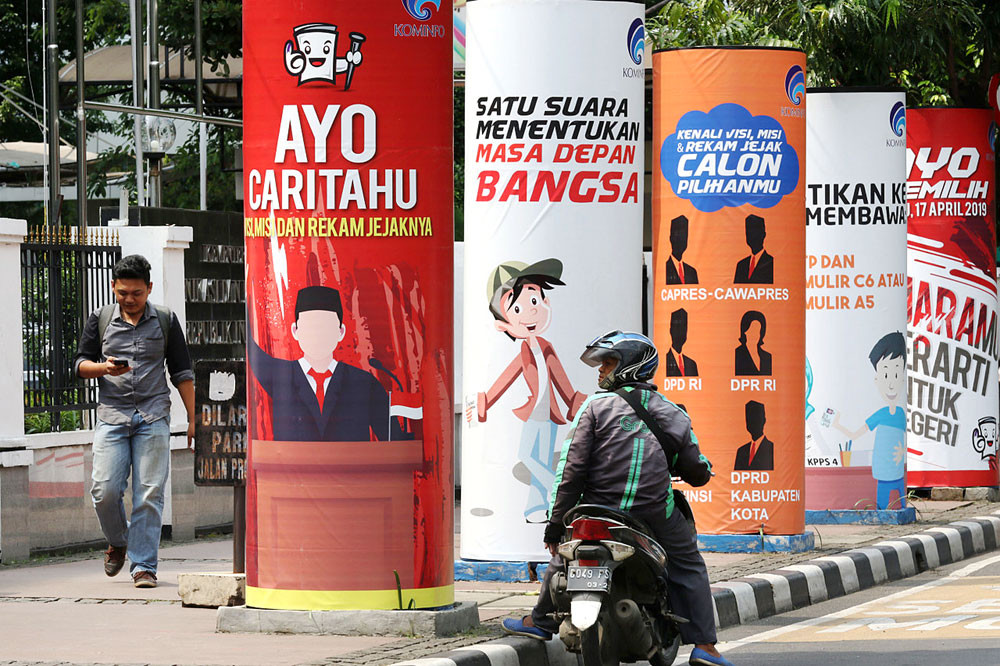Popular Reads
Top Results
Can't find what you're looking for?
View all search resultsPopular Reads
Top Results
Can't find what you're looking for?
View all search resultsInsight: The 2019 simultaneous elections: Why they matter to us
Change text size
Gift Premium Articles
to Anyone
 A man passes advertising columns standing side by side in front of the Communications and Information Ministry on Jl. Medan Merdeka Barat in Central Jakarta. The posters ask voters to inform themselves on legislative and presidential candidates before the election on April 17. (The Jakarta Post/Dhoni Setiawan)
A man passes advertising columns standing side by side in front of the Communications and Information Ministry on Jl. Medan Merdeka Barat in Central Jakarta. The posters ask voters to inform themselves on legislative and presidential candidates before the election on April 17. (The Jakarta Post/Dhoni Setiawan)
O
n April 17, about 192 million Indonesian voters will be eligible to cast their ballots at polling stations (TPS) all over the country. These are the first simultaneous elections ever held under the Indonesian election system, where voters will choose their president and vice president, members of the House of Representatives, Regional Representative Council (DPD) and members of two levels of regional legislatures (provincial and municipal councils, or DPRDs).
The 2019 elections will be historic as they will usher in Joko “Jokowi” Widodo, if elected, as the first president to come to office under this new system. As most surveys have shown he stands a good chance of being re-elected, when his presidency ends in 2024, there will not be any incumbent taking part in the presidential election in that year.
It is a watershed that an entirely new set of national leaders will come up, most probably from the provinces where some of the currently sitting governors may later participate in the presidential race. They may come from a province in Java or from one of the outer provinces, perhaps from South Sulawesi to mention just one.
The simultaneous elections system may be good for the country, mainly in one respect, that it brings to an end the holding of individual local elections in various regions throughout the year as in the past. The new system will obviously ease the disruption caused by individual local elections being held separately.
As was the case in 2014, several weeks before the April elections Jokowi is polling around 55 percent among credible surveys, whereas Prabowo is holding at around 37-40 percent. However, the end results are still uncertain, as surveys are like snapshots taken at a certain time, and there is no guarantee that voter preferences will remain the same at election time.
First, voter turnout may be low. Second, chances are voters will make all sorts of errors in voting as they will be presented with ballot papers for the presidency and three or four more for the legislative bodies (House, DPD, provincial and municipal DPRDs). People may get easily confused by the new way of voting.
Now with only a few weeks remaining for campaigning, the trends should be clear on each candidate’s political and electoral strengths.
The presence of political party witnesses at the TPS is very important to prevent possible rigging by the different levels of election committees in processing the votes, from the TPS to the General Elections Commission (KPU). All these hurdles have to be overcome to ensure voters are able to vote fairly. These six weeks to come are very important in achieving that result.
A convincing victory is important for President Jokowi, so there can be no doubt about his full mandate. With this mandate he will be able to select the best people to assist him as members of his future Cabinet, and to give him more power to face pressures from inside and outside of the government. The struggle to win the election is still very challenging, and pro-Jokowi supporters must do their utmost to win big to demonstrate the ultimate mandate entrusted in him by the Indonesian people.
President Jokowi deserves a second term because he genuinely has the Indonesian people’s interests at heart, and he is clean from corruption. His achievements for Indonesia in his first term are obvious, and he is expected to do even better in the second term after all the experiences and acumen he has gained.
It is also expected that he will know his coalition partners better, and, therefore, he will have a better team to appoint into his new Cabinet. He needs this because international economic developments will be more challenging than in 2018, and there is the possibility of greater instability in regional and international politics.
Many observers, Indonesian and foreign alike, have become concerned by the seemingly mounting religious conservatism as shown in the Jakarta regional election two years ago. However, that should be seen as a special case where the incumbent candidate was controversial and politically arrogant, which opened up the chance for radicals to incite anger and hatred among a sizable section of the Muslim populace against him. Fortunately, such a figure is not running in these elections and the police and government are more alert to deal with outbreaks of radicalism.
One good thing is that Indonesia has been blessed in having peaceful and orderly general elections since the first one in 1955, to the four held in the post-Reform Era.
***
The writer is vice chair of the board of trustees, CSIS Foundation, Jakarta.










